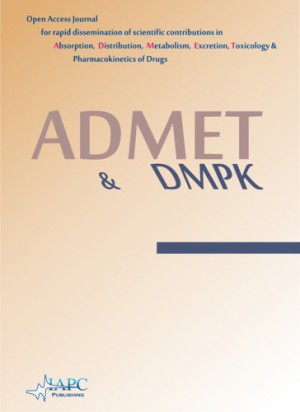
ADMET & DMPK
Yazarlar: Ilija N. Cvijetić, Dušan D. Petrović, Tatjana Ž. Verbić, Ivan O. Juranić, Branko J. Drakulić
Konular:-
DOI:10.5599/admet.2.2.28
Anahtar Kelimeler:Fluorescence spectroscopy,Competitive binding,Molecular dynamics,Molecular docking
Özet: Interactions of 2-[(carboxymethyl)sulfanyl]-4-oxo-4-(4-tert-butylphenyl)butanoic acid (compound 1) and its mono-Me ester (compound 2) with the human serum albumin (HSA) have been studied by fluorescence spectroscopy. Comp. 1 exerts antiproliferative activity toward human tumor cells and significant selectivity (tumor vs. healthy cells) in vitro. Competitive binding study with warfarin and ibuprofen as binding site probes, revealed that one molecule of comp. 1 selectively binds to HSA Sudlow site I (warfarin site) with moderate binding constant (Kb = (2.8 ± 0.5) x 104 M-1 at 37 ± 1 oC), while comp. 2 binds to Sudlow site II (Kb = (3.2 ± 0.9) x 104 M-1 at 37 ± 1 oC). Fluorescence quenching at different temperatures was analyzed using classical Stern-Volmer equation, and a static quenching mechanism was proposed. Energy resonance transfer between HSA and comp. 1 was examined according to Förster’s non-radiative energy transfer theory. Distance of about 10 Å between ligand and Trp214 (HSA) was obtained. Docking studies confirmed HSA Sudlow site I as a preferable comp. 1 binding site, and Sudlow site II as comp. 2 binding site. Molecular dynamics simulations proved the stability of comp. 1/HSA complex.